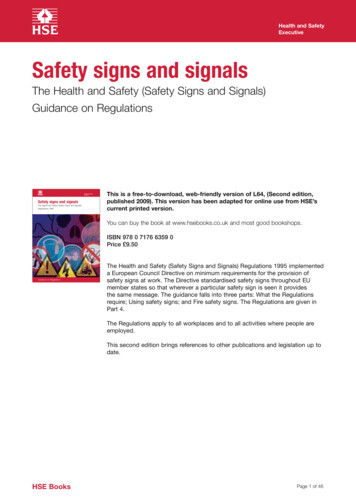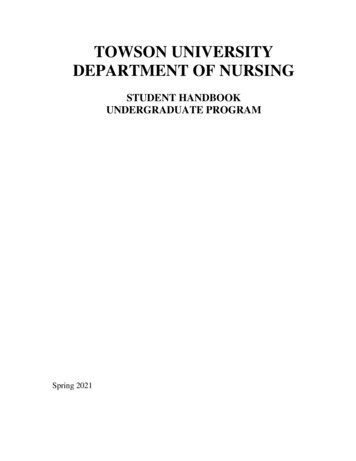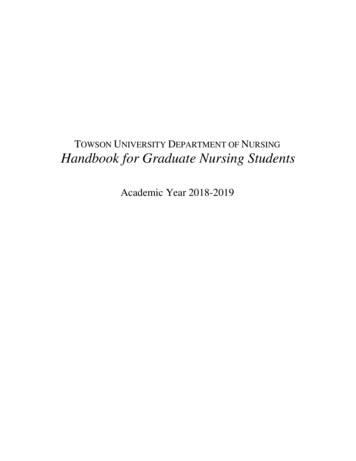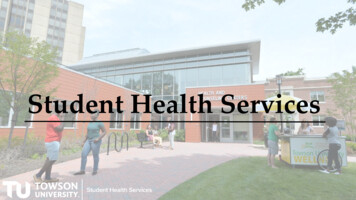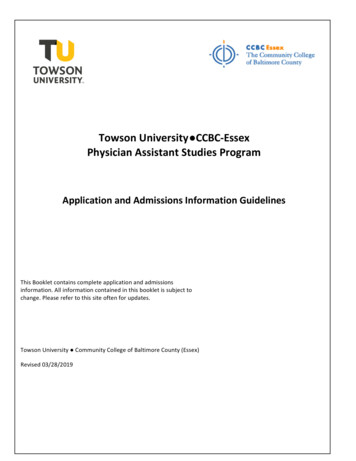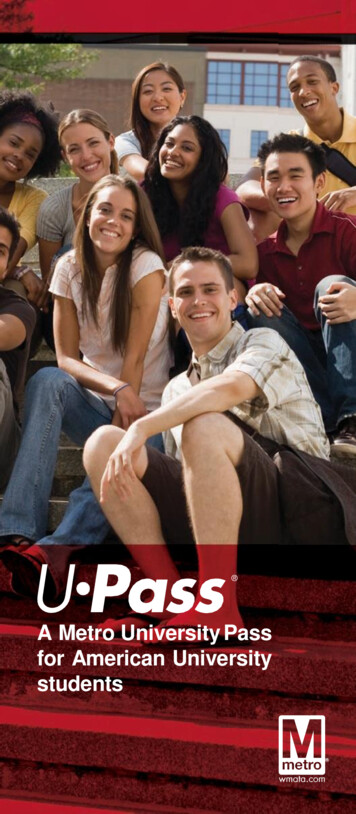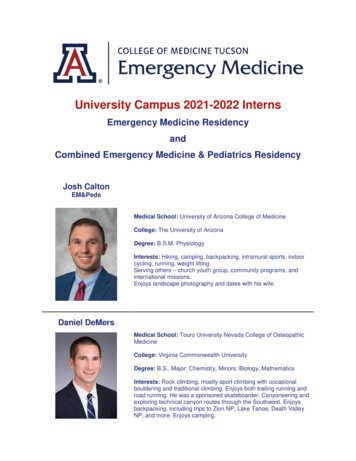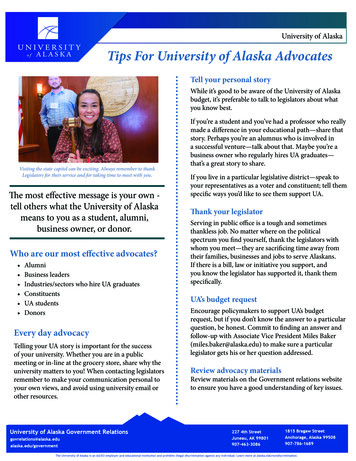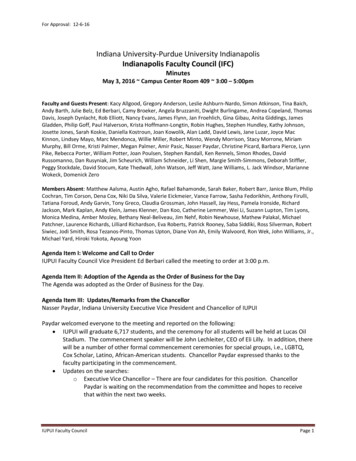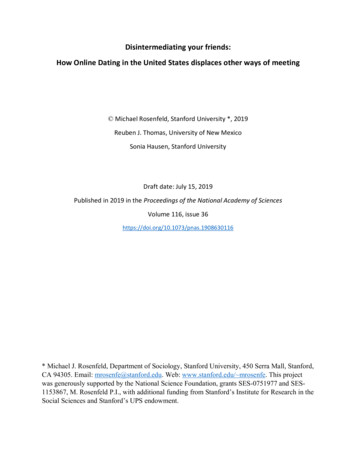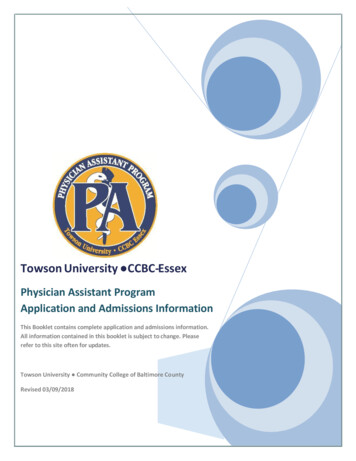
Transcription
Towson University CCBC-EssexPhysician Assistant ProgramApplication and Admissions InformationThis Booklet contains complete application and admissions information.All information contained in this booklet is subject to change. Pleaserefer to this site often for updates.Towson University Community College of Baltimore CountyRevised 03/09/2018
The contents of this booklet may not bechanged or duplicated without the -Essex Physician AssistantProgram Governing Committee.All policies are subject to change. Prospective applicants are required to abideby the Towson University/Community College of Baltimore County admissionpolicies. It is the applicant’s responsibility to read the booklet and becomefamiliar with the policies and principles detailed within the document. Shouldfurther questions arise, please contact the Program Director.Information and Admissions BookletPage 2
TABLE OF CONTENTSTop Reasons Prospective Students Choose Us . 4The PA Profession . 5Program Description . 7PA Program History. 8Program Sequence of Study . 9Description of Program Courses . 10Program Mission . 15PA Program Objectives . 16Educational Objectives . 16Clinical Practice Objectives . 17NCCPA Pass Rates . 20Financial Aid . 21Basics . 21Projected PA Program Tuition Costs. 21PA Program Expenses in Addition to Tuition & Fees. 23Admissions Requirements . 24International Students . 25United States Military Personnel . 26Application Process . 27Requirements for Successful Completion of Program . 29Physician Assistant Essential Functions . 30Professional Technical Standards . 30PA Program Candidate Guidelines and Information . 31Prerequisite Courses Equivalents . 35Frequently Asked Questions . 36General Information . 36Application . 37Admission Requirements . 38Admissions Interviews . 39Tuition and Financial Aid. 41Physician Assistant Applicant Examples of Patient Contact/Healthcare Experience . 43Information and Admissions BookletPage 3
TOP REASONS PROSPECTIVE STUDENTS CHOOSE US Solid reputation built on more than 40 years of excellence in PA education- Master’s Program initiated in 2001 Master’s degree program focusing on excellence in clinical practice, especially primarycare- Completion of seven (7) different clinical rotations in Year II- Close working relationships between students and faculty- Selection of final preceptorship in student’s area of interest Excellent student-to-faculty ratio- Thirty-six (36) students per class- Six (6) full-time faculty members with clinically experienced adjunct faculty membersfor specialty instruction Excellent graduate pass rate for the national certification exam 100% placement rate for all graduates seeking employment as a physician assistant- Assistance from the Program and faculty- Interest from local employers seeking Towson/CCBC-Essex graduates Experienced core faculty members Excellent clinical instructors and top-notch teaching sites- Affiliations with all of the major medical teaching institutions in the BaltimoreMetropolitan Area including: The Johns Hopkins Medical Center, GreaterBaltimore Medical Center, University of Maryland Medical Center, St. Joseph’sMedical Center- Participation of private physician offices- Clinical instructors dedicated to producing the best PAsInformation and Admissions BookletPage 4
THE PA PROFESSIONThe title "physician assistant" or "PA" refers to health care providers who are licensed topractice medicine with the supervision of a licensed physician. The concept of the professionoriginated in the 1960s as a way to enhance provision of health care to medically underservedcommunities. The founding of the profession was based on accepting the premise that withspecial training and education other health professionals could perform many of a physician’sfunctions with equal competence.Physician assistants, by nature of their education, are prepared to perform many duties thatwere most commonly the responsibilities of the physician. PAs are allowed to practice in all 50states, the District of Columbia, and Guam. They can also be employed in a broad range ofmedical facilities including private physician’s offices, hospitals, nursing homes, HMOs,occupational health centers, emergency departments, the military and correctional institutions.Working with the supervision of a physician and as a part of the larger medical team, PAspractice medicine through history taking and physical examination as well as ordering orperforming laboratory tests. They formulate diagnoses and develop management plans afteranalyzing medical data. Additionally, PAs perform many diagnostic and therapeutic proceduresincluding casting, splinting, and minor surgery procedures such as suturing and biopsies. All 50states, including Maryland, allow physician assistants to prescribe medications.The physician assistant profession is a rapidly growing career field with employment opportunitiesexpected to grow through the next decade.Information and Admissions BookletPage 5
SCOPE OF PRACTICEThe physician assistant is academically and clinically prepared to provide healthcare serviceswith the direction and responsible supervision of a doctor of medicine or osteopathy. Withinthe physician/PA relationship, physician assistants make clinical decisions and provide a broadrange of diagnostic, therapeutic, preventive and health maintenance services. The clinical roleof PAs includes primary and specialty care in medical and surgical settings. PA practice is centeredon patient care and may include: educational, research and administrative activities.The role of the physician assistant demands intelligence, sound judgment, intellectual honesty,appropriate interpersonal skills, and the capacity to react to emergencies in a calm and reasonedmanner. An attitude of respect for self and others, adherence to the concepts of privilegeand confidentiality in communicating with patients, and a commitment to the patients' welfareare essential attributes.PA practice is characterized by clinical knowledge and skills in areas traditionally defined as familyMedicine, internal medicine, pediatrics, obstetrics, gynecology, surgery, and psychiatry/behavioral medicine. Specific tasks performed by individual PAs cannot b e delineated preciselybecause of the variation in practice requirements mandated by geographic, political, economic,and social factors. At a minimum, however, PAs are educated in areas of basic medical science,clinical disciplines, and discipline-specific problem solving. Physician assistants practice inambulatory, emergency, inpatient, and long-term care settings. Physician assistants deliverhealthcare services to diverse patient populations of all ages with a range of acute and chronicmedical and surgical conditions. They need knowledge and skills which allow them to functioneffectively in a dynamic healthcare environment. Services performed by physician assistants whilepracticing with physician supervision include, but are not limited to, evaluation, monitoring,therapeutic, patient education and referral.Information and Admissions BookletPage 6
Program DescriptionThis collaborative program of the Community College of Baltimore County (CCBC) and TowsonUniversity (TU) is designed for students who hold a bachelor’s degree prior to admission. Itprepares individuals with strong academic backgrounds and clinical experience for careers asPhysician Assistants. Full-time continuous enrollment is required throughout the 26-monthprogram. The Accreditation Review Committee on Education of Physician Assistants (ARC-PA)accredits the program. Graduates are eligible for certification by the National Commission on theCertification of Physician Assistants (NCCPA).The Accreditation Review Commission on Education for the Physician Assistant (ARC-PA) hasgranted Accreditation-Continued status to the Towson University/CCBC-Essex PhysicianAssistant Program sponsored by Community College of Baltimore County. AccreditationContinued is an accreditation status granted when a currently accredited program is in compliancewith the ARC-PA Standards. Accreditation remains in effect until accreditation is withdrawn forfailure to comply with the Standards. The approximate date for the next validation of the programby ARC-PA will be September 2023. The review date is contingent upon continued compliance withthe Accreditation Standards and ARC-PA policy.Entry into the program requires admission to Towson University and CCBC as well as admissionto the collaborative PA Program. Enrollees must successfully complete all requirements of theprogram, which include both Towson University and CCBC courses. The program of study is 99credits—as of the class entering in the summer of 2017, the plan is for the curriculum to transition to60 graduate credits taken through Towson University and 39 undergraduate credits providedthrough CCBC. The majority of courses occur on the CCBC-Essex campus. Some educational activitiesoccur on the Towson University campus. Enrollees enjoy full student privileges on both campuses.Faculty have teaching appointments at either institution.The physician assistant curriculum (CCBC and Towson University courses) integrates a large volumeof technically-detailed information. Successful completion of the program requires strong science,general education, and medical experience preparation, as well as intense study and commitmentthroughout the 26-month Program. The first year of study is in large part didactic in nature.Students attend classes for 35 to 40 hours per week. In the second year, students complete clinicalrotations in medicine, family practice, pediatrics, women’s health, emergency medicine,community medicine and surgery. They will also complete an elective rotation and an eight-weekprimary care preceptorship. Students return to the Essex campus between rotations for classesduring their clinical year.Students will register for 200 level courses with CCBC-Essex and will register for 600, 700 and 800level courses with Towson University. Tuition and fees for 200 level courses are paid to CCBC-Essex.Tuition and fees for 600, 700, and 800 level courses are paid to Towson University. Applicants willpay application fees to each institution as appropriate. Towson University graduate course GPAsare calculated separately from CCBC courses. Students will receive two grade reports eachsemester and carry a GPA separate for Towson University and CCBC-Essex. Comprehensive recordsfrom both institutions are maintained by CCBC-Essex. Lastly, each student will receive an overallProgram GPA, which incorporates performance from both Towson University and CCBC-EssexInformation and Admissions BookletPage 7
courses.PA PROGRAM HISTORYThe oldest and most well established program in Maryland, the Essex Physician Assistant Programbegan in 1972 as a cooperative effort with the Johns Hopkins University and Franklin SquareHospital with separate tracks at each institution. Both tracks were integrated as one in 1976.Now a collaborative effort of CCBC-Essex and Towson University; the program has undergone adynamic evolution over its 40-year history. More than 1,000 program graduates are employedin a wide variety of medical settings in regional, national, and international locations.TOWSON UNIVERSITYFounded in 1866, Towson University is recognized among the nation’s finest regional publicuniversities, offering more than 90 undergraduate and graduate programs from the bachelor’sto doctoral level. It is the second-largest institution in the University System of Maryland (over20,000 students) and the largest comprehensive university in the Baltimore area.Towson University is regularly recognized among regional and national public institutions by U.S.News and World Report, The Princeton Review, and Forbes. Located in the suburban communityof Towson, just eight miles north of downtown Baltimore, the 328-acre beautifully landscapedcampus has an impressive blend of traditional and modern architecture. The campus isapproximately ten miles from the CCBC-Essex campus, which is also in the suburban Baltimorearea. Towson has graduated more than 100,000 students, including more than 10,000 withgraduate degrees.COMMUNITY COLLEGE OF BALTIMORE COUNTYIn October of 1998, by action of the Baltimore County Council, the three Baltimore CountyCommunity Colleges (Catonsville, Dundalk and Essex) became The Community College ofBaltimore County. The former Essex Community College was established in 1957 and has a longhistory of excellence in allied health professional programs. The CCBC-Essex campus ofapproximately 147 acres is located in a wooded setting in eastern Baltimore County. Nine majoracademic buildings house classrooms, laboratories, offices for faculty and staff, and specialfacilities such as the library, the community center, the theater, and School of Health ProfessionsProgram laboratories. Franklin Square Hospital Center occupies 100 acres adjacent to the collegeand provides a convenient site for shared clinical education activities. Tree-lined parking areas,pedestrian plazas, large lawns, and special gardens complete the campus environment.Information and Admissions BookletPage 8
For STUDENTS ENTERING IN SUMMER 2017 AND BEYONDPLANNED PROGRAM SEQUENCE OF STUDYYEAR ISummer Session I (First Five Weeks)PAST212Public Health and Preventative MedicinePAST224Gross AnatomyPAST236Basic Physical DiagnosisPAST202Ethics, Issues, & TrendsSummer Session II (Second Five Weeks)PAST214Psychosocial Issues in Medicine IPAST225Human PathophysiologyPAST603Medicine 606609Psychosocial Issues IIDiagnostic Studies IAdvanced Physical DiagnosisMedicine IIPediatrics IPharmacology I22262216231605Diagnostic Studies IIMedicine agnostic Studies IIIIntroduction to Clinical PracticeResearch MethodsPediatrics IIMedicine IVPharmacology II24326219PAST251Clinical Practicum I66PASTPASTPASTPAST252653730801Clinical Practicum IIClinical Practicum IIIClinical Management Seminar I (Summer Start)Research Seminar I (Summer Start)662216654Clinical Practicum IV33PASTPASTPAST655731802Clinical Practicum VClinical Management Seminar II (Winter Start)Research Seminar II (Winter Start)112114PAST756Clinical Practicum VI66Winter (Minimester)PASTPASTSpringYEAR IISummerFallWinter (Minimester)PASTSpringSummerTOTAL CREDITS:Information and Admissions Booklet99Page 9
DESCRIPTION OF PROGRAM COURSESPAST 202Ethics, Professional Issues and Trends3 CreditsThis course examines professional and ethical issues, as well as legal implications, confrontingthe physician assistant. Effect of social, political and economic changes is also explored, togetherwith the physician assistant role in the health care team. Prerequisite: Admission to program.PAST 212Public Health and Preventive Medicine2 CreditsThis course serves as an introduction to the dynamics of health and disease in humanpopulations. In addition, the maintenance of health and prevention of illness in services andfacilities will be discussed. Current clinical prevention standards, public health methods, clinicalepidemiology, and relevant public health models for clinicians will be taught in detail.Demography, epidemiology, environmental health, provision of medical services, preventivemedicine and infectious disease will be explored. Basic principles of health policy making willalso be addressed.PAST 214Psychosocial Issues in Medicine I2 CreditsThis course will provide an understanding of the psychological processes underlying humanbehavior in medical settings. Emphasis is placed upon the dynamics of the patient-healthprovider relationship. Topics include the following: communication skills, approaches topatients, working with special populations, cross-cultural communication, stress and disease,chronic illness, adherence, domestic violence, human sexuality issues, and death and dying.PAST 216Psychosocial Issues in Medicine II2 CreditsThis course is designed to provide the student with an understanding of
Towson University CCBC-Essex Physician Assistant Program . Excellent graduate pass rate for the national certification exam . universities, offering more than 90 undergraduate and graduate programs from the bachelor’s to doctoral level. It is the second-largest
